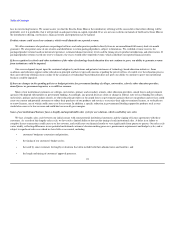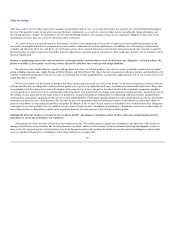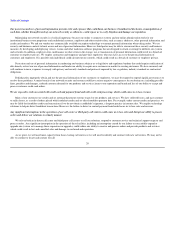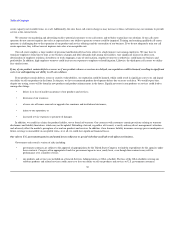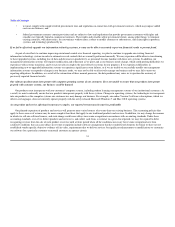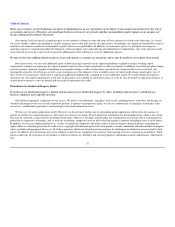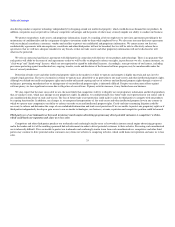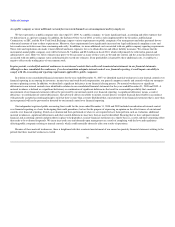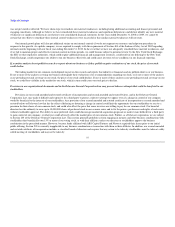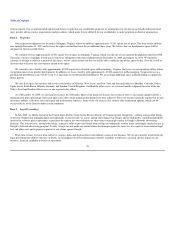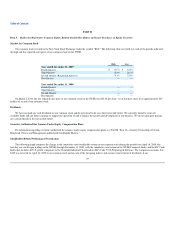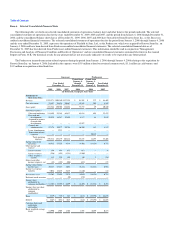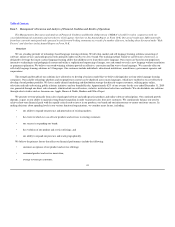Rosetta Stone 2009 Annual Report Download - page 36
Download and view the complete annual report
Please find page 36 of the 2009 Rosetta Stone annual report below. You can navigate through the pages in the report by either clicking on the pages listed below, or by using the keyword search tool below to find specific information within the annual report.
Table of Contents
Our trademarks are limited in scope and geographic coverage and may not significantly distinguish us from our competition.
We own several federal trademark registrations, including the Rosetta Stone mark, hold common law trademark rights and have federal trademark
applications pending in the United States and abroad for additional trademarks. Even if federal registrations are granted to us, our trademark rights may be
challenged. It is also possible that our competitors will adopt trademarks similar to ours, thus impeding our ability to build brand identity and possibly leading
to customer confusion. In fact, various third parties have registered trademarks that are similar to ours in the United States and overseas. We could incur
substantial costs in prosecuting or defending trademark infringement suits. If we fail to effectively enforce our trademark rights, our competitive position and
brand recognition may be diminished.
We have not registered copyrights for all our products, which may limit our ability to enforce them.
We have not registered our copyrights in all of our software, written materials, website information, designs or other copyrightable works. The United
States Copyright Act automatically protects all of our copyrightable works, but without a registration we cannot enforce those copyrights against infringers or
seek certain statutory remedies for any such infringement. Preventing others from copying our products, written materials and other copyrightable works is
important to our overall success in the marketplace. In the event we decide to enforce any of our copyrights against infringers, we will first be required to
register the relevant copyrights, and we cannot be sure that all of the material for which we seek copyright registration would be registrable in whole or in
part, or that once registered, we would be successful in bringing a copyright claim against any such infringers.
We must monitor and protect our internet domain names to preserve their value. We may be unable to prevent third parties from acquiring domain names
that are similar to, infringe on or otherwise decrease the value of our trademarks.
We own several domain names that include the terms Rosetta Stone and Rosetta World. Third parties may acquire substantially similar domain names
that decrease the value of our domain names and trademarks and other proprietary rights which may hurt our business. Moreover, the regulation of domain
names in the United States and foreign countries is subject to change. Governing bodies could appoint additional domain name registrars or modify the
requirements for holding domain names. Governing bodies could also establish additional "top-level" domains, which are the portion of the Web address that
appears to the right of the "dot," such as "com," "gov" or "org." As a result, we may not maintain exclusive rights to all potentially relevant domain names in
the United States or in other countries in which we conduct business, which could harm our business or reputation.
Claims that we misuse the intellectual property of others could subject us to significant liability and disrupt our business.
We may become subject to material claims of infringement by competitors and other third parties with respect to current or future products, e-commerce
and other web-related technologies, online business methods, trademarks or other proprietary rights. Our competitors, some of which may have substantially
greater resources than us and have made significant investments in competing products and technologies, may have, or seek to apply for and obtain, patents,
copyrights or trademarks that will prevent, limit or interfere with our ability to make, use and sell our current and future products and technologies, and we
may not be successful in defending allegations of infringement of these patents, copyrights or trademarks. Further, we may not be aware of all of the patents
and other intellectual property rights owned by third parties that may be potentially adverse to our interests. We may need to resort to litigation to enforce our
proprietary rights or to determine the scope and validity of a third-party's patents or other proprietary rights, including whether any of our products,
technologies or processes infringe the patents or other proprietary rights of third parties. We may incur substantial
34


